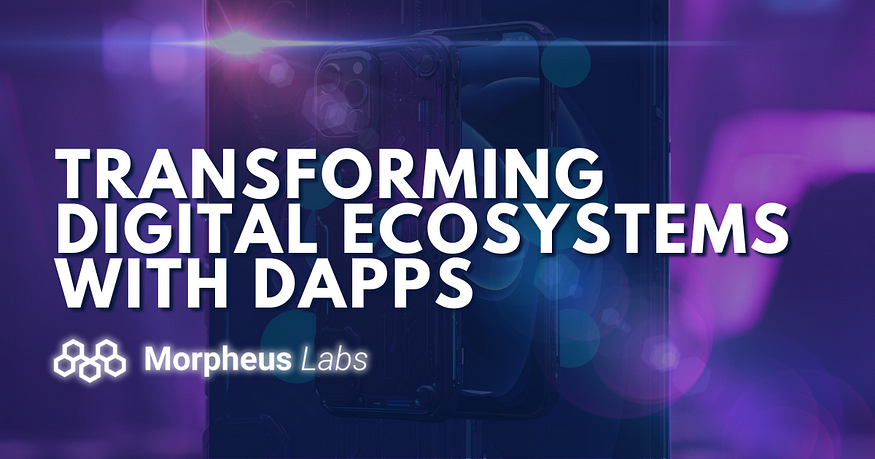News blog
labore et dolore magna eiusmod
consectetur adipiscing elit, sed do eiusmod tempor incididunt ut labore et dolore magna aliqua. Ut enim ad minim veniam, quis nostrud exercitation ullamco laboris nisi ut aliquip ex ea commodo consequat risus Ut mattis

Transforming Digital Ecosystems With DAPPS
Decentralised applications (DApps) are reshaping the digital landscape by utilising blockchain technology to offer secure, transparent, and autonomous solutions. These applications operate on decentralised networks, eliminating the need for intermediaries and providing users with greater control. Below, we explore the mechanics of DApps, their benefits, challenges, and impact across various industries.
Understanding DApps: The Backbone of Decentralisation
Decentralised applications, or DApps, run on blockchain networks like Ethereum, enabling them to function without a central authority. Unlike traditional applications that rely on centralised servers, DApps utilise smart contracts to execute operations, ensuring transparency and immutability.
Key Features of DApps
- Decentralisation: Operate on peer-to-peer networks, reducing reliance on central servers and minimising single points of failure.
- Open Source: Typically have open-source codebases, encouraging community collaboration and innovation.
- Incentivisation: Use tokens to incentivise users and developers, which can be utilised within the application or traded.
- Consensus Mechanisms: Rely on algorithms like Proof of Work (PoW) or Proof of Stake (PoS) to validate transactions and maintain network integrity.
Benefits of DApps: Enhancing Trust and Efficiency
DApps offer numerous advantages over traditional applications, making them attractive across various sectors. By leveraging blockchain technology, DApps ensure data integrity and security, making them resistant to tampering and fraud. Transparency is another key benefit, as all transactions and changes are recorded on the blockchain, providing complete traceability. Furthermore, DApps provide users with greater autonomy by allowing them to retain control over their data and interactions, reducing dependency on third-party services. Additionally, eliminating intermediaries reduces transaction costs and operational overheads, making DApps a cost-efficient solution.
Real-World Applications of DApps
DApps are making significant strides in various industries, demonstrating their potential to disrupt traditional models. In the finance sector, decentralised finance (DeFi) applications enable peer-to-peer lending, borrowing, and trading without intermediaries, offering greater accessibility and lower costs. In gaming, blockchain-based games allow players to truly own in-game assets, which can be traded or sold outside the game. Supply chain DApps enhance transparency and efficiency by providing real-time tracking and immutable records of goods movement. In healthcare, decentralised applications improve patient data management and security, facilitating the secure sharing of medical records.
Challenges in Implementing DApps
While DApps present significant benefits, they also face several challenges that need to be addressed for broader adoption. Scalability is a major issue, as current blockchain networks can struggle with high transaction volumes, leading to slower processing times and higher costs. User experience is another challenge; the complexity of blockchain technology can make DApps less user-friendly compared to traditional applications. Regulatory uncertainty also poses challenges for DApp developers, particularly regarding compliance with local and international laws. Despite their inherent security advantages, DApps are not immune to vulnerabilities, requiring rigorous testing and security measures.
Web3 Workflow Studio: Accelerate your blockchain projects with Morpheus Labs
Web3 Workflow Studio. This comprehensive platform streamlines the development, testing, and deployment of DApps, offering:
- Comprehensive Development Environment: Integrated tools for smart contract development, testing, and deployment.
- Enhanced Security and Compliance: Built-in security features and compliance tools ensure robust protection and regulatory adherence.
- Scalable Solutions: Scalable infrastructure to support growing DApp ecosystems and adapt to evolving business needs.
- Professional Support: Access to expert guidance and community support for seamless integration and optimisation of DApps.
Check out this video demo to see our latest product in action!
Explore how Morpheus Labs’ Web3 Workflow Studio can propel your organisation into the decentralised future. Start your first DApps project by using this link here.
Future of DApps: Innovations and Opportunities
The future of DApps looks promising, with ongoing advancements in blockchain technology and increasing interest from various industries. Innovations such as Layer 2 scaling solutions, cross-chain interoperability, and improved consensus algorithms are poised to address current challenges and enhance DApp performance.
Conclusion: Embracing the DApp Revolution
Decentralised applications transform how we interact with digital services, offering a secure, transparent, and efficient alternative to traditional applications. By addressing scalability, user experience, and regulatory challenges, DApps have the potential to become mainstream solutions across various sectors.



















